When you think of sensors being in your home, your mind more than likely drifts to the kind that exist in homes today: motion sensors, light sensors, or even fire alarms. But an expert team at the University of Miami is developing a concept beyond mainstream smart home technology—one that can change the way we live our everyday lives.
It may have been hard to imagine in a pre-pandemic world, but as a result of the ever-evolving smart technologies researchers developed, a home technology-empowered hub is closer than you can imagine.
At the fourth annual Smart Cities Miami 2021 conference, hosted by the School of Architecture and the Institute for Data Science and Computing (IDSC), Rodolphe el-Khoury, dean of the School of Architecture, led a session titled “UM Innovation Showcase,” which featured the work of an interdisciplinary team that is confronting some of the challenges and opportunities presented by COVID-19.
“The project we’re sharing today is in line with previous efforts we’ve presented, but this model is an interconnectivity of all scales,” said el-Khoury. “It will involve the clinic, the hospital, the pharmacy, and of course, the home, which we see it as an extension of the clinic and the primary site of health care.”
The work in progress reinvents the current hospital model by modifying it as a dispersed network that will include the home. The cutting-edge concept, described as a technology-empowered hub, can turn your living space into an interactive, mixed reality experience which can connect you to your physician in seconds.
“It’s the microcosm of the entire system, because it encapsulates and concentrates those four main functions: monitoring, treating, communicating, and data analysis,” said el-Khoury. “We think of it as the Swiss Army knife of sensors, jampacked with everything we are already developing. It can be customized and connected to appliances you already may have.”
The team members include Yelena Yesha, chief innovation officer and head of international relations for IDSC; Nicholas Tsinoremas, vice provost for research computing and data and founding director of IDSC; Sapna Deo, associate professor and biochemistry and molecular biology graduate program director at the Miller School of Medicine; Sylvia Daunert, the Lucille P. Markey Chair of Biochemistry and Molecular Biology at the Miller School of Medicine; and Leonidas Bachas, dean of the College of Arts and Sciences.
“Health care is moving towards the home,” said Tsinoremas, who looks forward to continuously developing the prototype and working with partners outside of the University. “This is an opportunity to have a ‘candy store’ of all the data in one place, if you will.”
Yesha, who is also a visiting professor of computer science and an expert in health care cybersecurity, said the new hub is not meant to replace care or medical professionals but is “bridging the gap between providing health care in the remote environment versus having it in the physical environment.”
“This is will be an opportunity to infuse the data so that we can seamlessly, in real time, analyze this data and make sense of it,” said Yesha, who’s aware of the need for patient consent of this new technology. “We want to build intelligence to assist the medical professional.”
The three-hour virtual conference featured participants from government, academia, and the private industry who each shared how smart city technology can be used to solve issues around the pandemic and health care. Keynote speaker Michael Mylrea, senior technical advisor to the University of Maryland, Baltimore County’s Center for Accelerated and Real Time Analytics, discussed blockchain technology and cybersecurity surrounding data collection. Plenary keynote speaker Mark Wolff, chief health analytics strategist for the SAS Institute, an international data analytics firm, shared his experiences in health care and how the internet of medical things and edge analytics are shifting the overall health care sector.
The conference also allowed professionals the chance to meet other leaders in the field and to share knowledge about practices in place today that are making cities more digitally connected than ever.
In closing, Tsinoremas and Yesha underscored how important having a health hub will be for individuals in a post-pandemic world.
“The integration of state-of-the-art technologies, with the data acquisition and handling done in a protective way, and then being able to communicate with the physician and the health care providers in a seamless way is a totally novel concept that does not exist,” said Yesha. “We have the Fitbits of this world and the Apple Watch that will tell us some information, but it is not like a holistic, total approach like the health hub will have. We are going one step further.”

